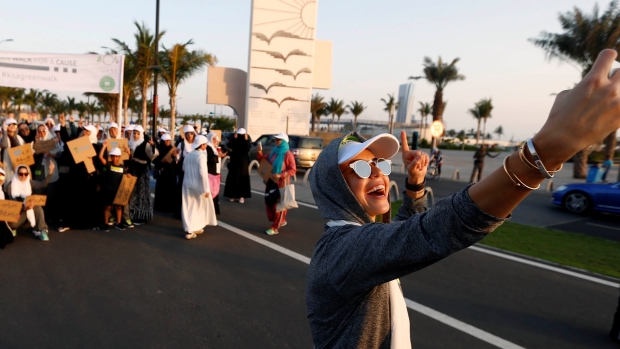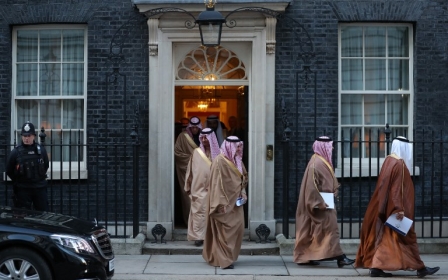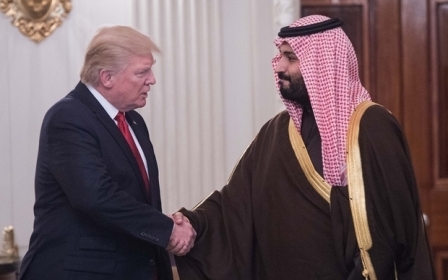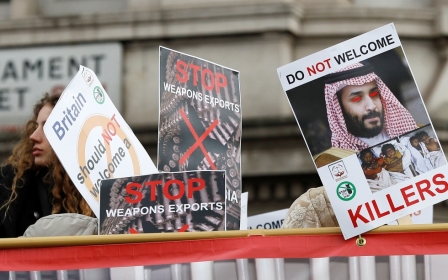A hard sell: Mohammed Bin Salman goes to Washington to flog a new Saudi Arabia
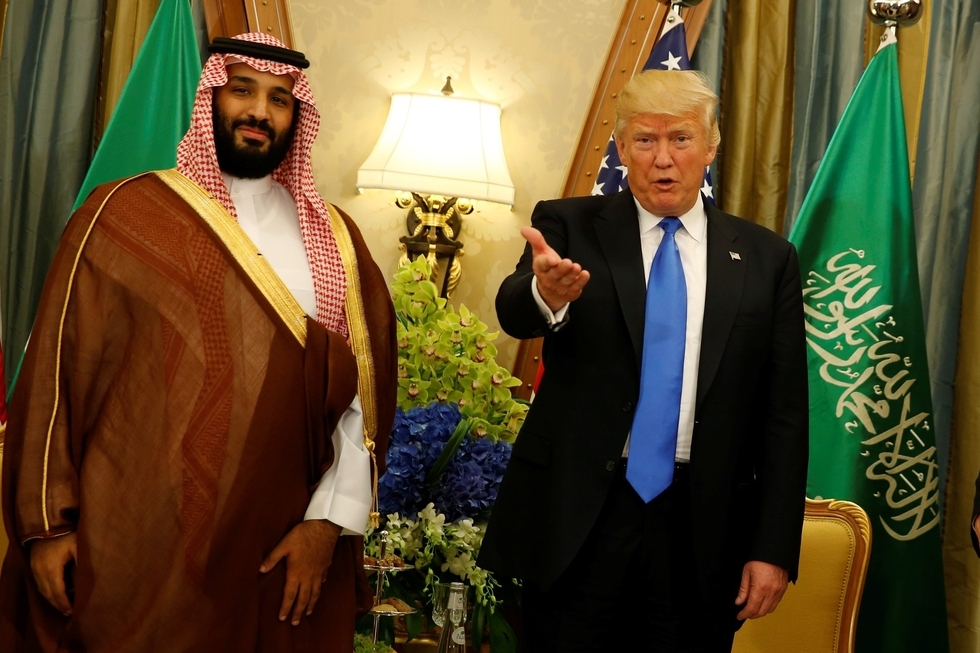
When the crown prince of Saudi Arabia, Mohammed bin Salman (MBS), arrives in Washington DC this week, he will be hoping to sell his vision of a new, open-for-business, and more socially progressive Saudi kingdom that is now finally both ripe and respectable enough for full spectrum foreign investment.
He will also be trying to persuade the world that Saudi's old, consensus-based "sheikhly" monarchy of pre-2017 was in fact a corrupt and bloated obstacle to progress, and that his more authoritarian and centralised style of leadership is exactly what's now needed.
Even if it has necessitated the locking up and shaking down of a few hundred oligarchs and princes, the shock-nationalising of major corporations, and the ruffling of more than a few powerful feathers along the way.
A clean break
MBS will also be hoping, though as a secondary objective, to persuade US decision-makers that his new administration represents a clean break from the predecessor regime's extensively documented connections - whether through state-backed charities or groups of wealthy individuals - to major extremist organisations, including those that have repeatedly turned around and targeted Western citizens.
MBS won't be bereft of all agency this week. His meetings certainly won't be a one-way street as he definitely has a couple of cards to play
Tellingly perhaps, senior Saudi officials have already begun to "admit" to this murky past. It now seems likely that Riyadh will try to spin historic US Department of the Treasury claims that the kingdom is the "epicentre" of terrorist financing as being more of a legacy, "sins of the fathers" issue, and therefore not one that need interfere with present-day Saudi-US relations.
Many in Washington DC will lap all of this up, liberals and conservatives alike, and will certainly roll out the red carpet for MBS, not least because on its previous trajectory, Saudi Arabia seemed to be hurtling toward some sort of bankrupt and potentially violent event horizon - one which would have served, in their eyes at least, only to destabilise further an already volatile region and to blow a gaping wide hole in the US' already rather precarious Middle East alliance structure.
Feeling empowered
Making his welcome seem even warmer, as MBS steps from his aircraft onto US soil, he will be feeling especially confident and perhaps even empowered.
Last week's departure of Secretary of State Rex Tillerson has been widely rejoiced in Saudi Arabia and its close ally the United Arab Emirates. Claims have even been made by prominent Saudi and Emirati voices that Tillerson's firing was something of a Saudi-UAE foreign policy coup.
After all, Tillerson's crisis-defusing, negotiation-based strategy last summer was seen as a major impediment to Riyadh and Abu Dhabi taking firmer and more decisive action against their current nemesis number one - the Muslim Brotherhood-supporting Qatar.
Making sense of this, MBS and MBZ's teams had identified, quite correctly, a schism between formal US foreign policy being run out of Tillerson's Department of State, and an informal, more patrimonial foreign policy being run by President Donald Trump and his close relatives.
Immediately following the beginning of the Qatar dispute last June, Trump had tweeted in support of the Saudi-UAE measures. He condemned Qatar's links to terrorism, without providing any evidence, and apparently without having consulted any US diplomats.
An opportune moment
A few months later, his son-in-law and special advisor, Jared Kushner, made an unannounced visit to Riyadh. Although ostensibly there to discuss Middle East peace, no details of who Kushner met with were provided to the public.
Only a few days later an obviously emboldened MBS launched his unprecedented anti-corruption "purge".
There's no doubt that Tillerson's firing has indeed been timed to coincide with MBS' visit, and at face value this does support some of the Saudi and Emirati claims. But Trump's decision at this precise and politically very opportune moment is perhaps better viewed as a sort of useful bonus for the White House, rather than as the underlying rationale behind the manoeuvre.
There's no doubt that Tillerson's firing has indeed been timed to coincide with MBS' visit, and at face value this does support some of the Saudi and Emirati claims
Tillerson has been on borrowed time for quite a while: probably ever since he reportedly called his boss a "moron" and then refused to deny he had said so.
More broadly, Tillerson's removal is likely also a function of much bigger power politics than the Gulf "side show", with the former secretary of state having long been seen as a buffer against the US resuming a tougher line on Iran.
Furthermore, with the recently emerging possibility of an historic US-North Korean accord being signed, it seems reasonable to assume that the president will be seeking full and undiluted credit for what could become his key foreign policy legacy in East Asia. He won't want the US' top diplomat in on the action.
A tighter US-Saudi alliance
That said, even if some of the current Saudi confidence may be misplaced, MBS won't be bereft of all agency this week. His meetings certainly won't be a one-way street as he definitely has a couple of cards to play, and at least some of the US' present circumstances are very much in his favour.
As with the British government, which is busily trying to re-establish Britain's sovereignty outside of the European Union and needs to demonstrate to the electorate that it can successfully strike big-ticket trade deals with far-flung places such as Saudi Arabia, Trump's administration is also one which is going to be ultimately judged on its ability to bring business to the country, and especially the investment-hungry "rust belt" states.
In this context, it's important to understand that as MBS aims for an even tighter political and economic Saudi-US alliance, he can promise pretty much anything he likes in Washington DC, without necessarily having to follow up.
As various US and British arms and oil companies have learned to their cost, if the value of all the headline-grabbing public promises of Saudi business made over the years was actually added up, it would massively dwarf the eventual and true total.
Already reading this situation pretty well, MBS and his team have correctly dangled like a carrot their proposed Aramco initial public offering – which could be worth up to $2 trillion, if one believes Saudi officials – over the stock exchanges of competing Western powers, and have kept everyone guessing in the process.
In many ways, Riyadh is doing a good job of emulating Abu Dhabi's savvy nuclear deal manoeuvrings of the past few years, which extracted key international endorsements for the UAE from major powers, before unexpectedly awarding the $40bn contract to a lower cost South Korean consortium.
Thus with the Aramco IPO, and perhaps even a Saudi nuclear deal, nobody should assume anything until all of the i's are dotted and all of the t's are crossed.
The game is on.
- Christopher M. Davidson is a Reader in Middle East politics, Durham University; Visiting fellow, Leiden University
The views expressed in this article belong to the author and do not necessarily reflect the editorial policy of Middle East Eye.
Photo: US President Donald Trump delivers remarks to reporters after meeting with Saudi Arabia's then Deputy Crown Prince and Minister of Defense Mohammed bin Salman at the Ritz Carlton Hotel in Riyadh, Saudi Arabia on 20 May 2017(REUTERS)
Middle East Eye propose une couverture et une analyse indépendantes et incomparables du Moyen-Orient, de l’Afrique du Nord et d’autres régions du monde. Pour en savoir plus sur la reprise de ce contenu et les frais qui s’appliquent, veuillez remplir ce formulaire [en anglais]. Pour en savoir plus sur MEE, cliquez ici [en anglais].



